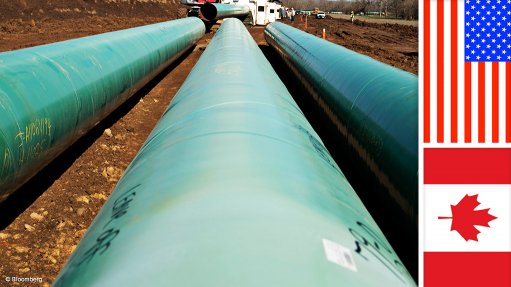
Name and location
Keystone pipeline Gulf Coast expansion (Keystone XL) project, Canada and the US.
Client
TransCanada Corporation (TransCanada).
Project description
The Keystone XL pipeline project will enable Canadian and US oil producers to have more access to the large refining markets found in the American Midwest and along the US Gulf Coast.
The project proposes a 1 897 km, 36-inch-diameter crude oil pipeline, beginning in Hardisty, in Alberta, and extending south to Steele City, Nebraska, both in the US. This pipeline is a critical infrastructure project for the energy security of the US.
Along with transporting crude oil from Canada, the Keystone XL pipeline will also support the significant growth of crude oil production in the US from producers in the Bakken region of Montana and North Dakota.
The pipeline will have capacity to transport 830 000 bbl/d of oil to Gulf Coast and Midwest refineries, reducing American dependence on oil from Venezuela and the Middle East by up to 40%.
Value
$8-billion.
Duration
TransCanada expects to have the pipeline in service by 2015.
Latest developments
The Keystone XL project has cleared two hurdles, setting up a showdown between Congress and President Barack Obama who has raised new questions about the project after more than six years of review.
Following months of deliberation, the Nebraska Supreme Court allowed for a pipeline route to cross the state, shifting the debate over TransCanada Corp's project fully to Washington, where Republicans, now in control of Congress, are seeking to force its final approval.
The House of Representatives passed a Bill 266 votes to 153 in December 9, 2014, with 28 Democrats supporting the project. The Senate is expected to debate a Keystone Bill, but White House officials say Obama will reject the legislation.
Obama has criticised the pipeline, saying it will do little to cut prices for US consumers and that it will mainly benefit the company, as the petroleum will eventually be shipped abroad.
In Nebraska, the legal question has narrowly focused on whether former Governor Dave Heineman had a right to approve the route of the pipeline in his state. However, the court was deadlocked, which amounted to a ruling in the company's favour.
The pipeline has galvanised environmentalists, who regard it as an emblem of fossil fuel dependence, and energy interests, who regard a Canada-to-Texas pipeline system as a tool to spur more energy production in North America.
Obama has said he cannot endorse a project that meaningfully worsens climate change and the issue could become one of the more controversial ones of his second term.
However, Congress may yet settle the matter if Republicans can surmount an Obama veto or attach a Keystone provision to must-pass legislation, such as a spending Bill or a wider energy measure.
Senator John Hoeven, a North Dakota Republican who is sponsoring the legislation, has said he has 63 votes for the bill, four short of the number needed to overturn any veto.
The court's ruling enables the US State Department to decide whether the pipeline meant to carry Canadian oil sands petroleum will be in the country's interest, a necessary step for the cross-border project.
Environmentalists oppose Keystone, since it could help expand emissions-intensive development of the oil sands.
Key Contracts and Suppliers
None stated.
On Budget and on Time?
Keystone XL has been delayed, owing to the rejection of TransCanada’s application for a permit to build and operate the project.
Contact Details for Project Information
TransCanada, tel +1 866 717 7473 or email keystone@transcanada.com.